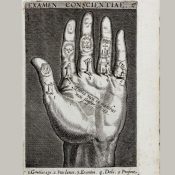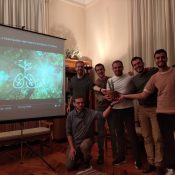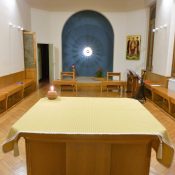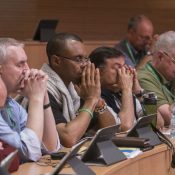During the month of Spiritual Exercises, I lived and experienced for the first time what St. Ignatius of Loyola calls the ‘Repetition of a meditation or contemplation exercise’. This consists in meditating a Bible passage or any other exercise described by St. Ignatius for a second time, putting emphasis on those points in which one has felt major consolation or desolation or greater spiritual feeling (Spiritual Exercises [62,2]).
When I got to know that I had to do this type of exercise, I was struck by a feeling of frustration and asked myself: “What else can this Bible passage tell me?” This thought had crossed my mind many times before the month of Spiritual Exercises and, in fact, it happened quite frequently to meditate on the same Scripture passage with wariness, lacking an attitude of engagement with the text. During this long retreat, however, I noticed that my frustration and dissatisfaction were hindering me from accepting a profound truth: that prayer does not depend on my thoughts and expectations, and that I’m not the protagonist of such a time. On the contrary, it is the benevolent presence of God that awaits me and desires to meet me as I am, even though I could feel distant from Him.
In the Letter to the Hebrews, Saint Paul writes that the word of God is alive and active and judges the thoughts and attitudes of the heart (cf. Heb 4:12); keeping in mind such truth, I didn’t feel the need to worry anymore about meditating the same passage and the same words of the Gospel. This experience brought about great inner freedom and it taught me how to let go of my expectations and ideals, which I usually set before starting the moment of prayer. With this disposition of the soul, I could face and engage, in much more depth, with the various repetitions of the Biblical passages, observing slightly clearer what my interior movements were telling me. Moreover, there were specific days where I experienced more “taste” in the second hour of prayer (the repetition) compared to the first hour, which proved to be hard and tedious.
I believe that this method of repetition, proposed by St. Ignatius in the Spiritual Exercises, could be useful and valid not only for personal and community prayer but also for our everyday life. Often, we find ourselves immersed in long days made up of a succession of things to do and this could provoke a sense of boredom and perhaps apathy in us, giving up on the beauty and surprises that such days could offer. In a world where joy seems to depend on the latest market news and the many earthly pleasures that weigh down the soul and try to wither our heart, stopping and taking the time to reread our days and delve into the true meaning of our everyday life may seem a waste of time. This is a real temptation and none of us is exempt from experiencing it, and could lead us to live our daily lives with mediocrity. Deciding to act against this temptation will help us recognise His living and consoling presence, particularly in those areas of our life where everything seems dull, unknown and dead.




















